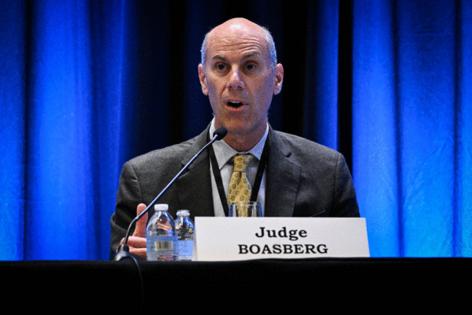Shutdown pauses Trump policy challenges and other civil cases
Published in Political News
WASHINGTON — The partial government shutdown led federal courts to temporarily delay dozens of challenges to Trump administration policies Wednesday and prompted Justice Department attorneys to seek a pause in civil cases across the country.
The shutdown plan for the DOJ states that civil litigation will be curtailed or postponed when it does not compromise the safety of human life or the protection of property. And the guidance says litigators will approach the courts and request that active cases be postponed until funding is available.
In the U.S. District Court for the District of Columbia, the epicenter of civil cases related to the federal government, Chief Judge James E. Boasberg ordered a blanket pause on government deadlines in civil lawsuits involving the administration until up to 10 days after government funding resumes.
Boasberg said the number of cases involving the government in Washington made it more efficient to pause them all together.
Those cases include disputes over President Donald Trump’s targeting of law firms, the District of Columbia government’s challenge to the deployment of National Guard troops, and U.S. Forest Service grant cancellations.
Across the nation, Justice Department attorneys requested delays in more than half a dozen civil lawsuits, including litigation brought against Pennsylvania and Oregon related to the production of certain voter registration information.
“Absent an appropriation, Department of Justice attorneys are prohibited from working, even on a voluntary basis, except in very limited circumstances,” the filings in the Pennsylvania and Oregon cases state.
Not all those requests will be granted. A federal judge in Rhode Island turned down the DOJ’s request Wednesday to pause a lawsuit involving Trump administration efforts to place new conditions on grant funding from the Department of Health and Human Services and the Department of Housing and Urban Development.
The DOJ had argued in a filing the appropriations lapse requires “a substantial reduction” in certain workforces.
“This reduction has effectively eliminated the ability of counsel who have worked on and are familiar with this case to handle the litigation and to file the Defendants’ motion papers while the lapse in appropriations continues,” the government wrote.
The delays have hit even years-old federal cases such as one in California over the environmental harms of barrier construction along the U.S.-Mexico border.
The groups that filed the challenge are seeking to enforce part of a 2023 settlement that they say committed the government “to undertake significant environmental mitigation and remediation work at project sites throughout the Southwest where they had constructed border walls using diverted DoD funds.”
The Justice Department asked to delay a case management report set for Oct. 14 and a case management conference set for Oct. 21, although they “greatly regret any disruption caused to the Court and the other litigants.”
“The Government requests that, at that point, all current deadlines for the parties be extended commensurate with the duration of the lapse in appropriations — i.e., each deadline would be extended by the total number of days of the lapse in appropriations,” the motion states.
The requests for a pause are unlikely to create long-term delays in the cases as of now, but the filings represent the most immediate impact of the government shutdown on the administration’s ability to defend its policies in court and move forward on its civil litigation.
The Supreme Court and the U.S. Court of Appeals for the District of Columbia Circuit announced they will keep their schedules. The DOJ guidance said if a court orders a case to continue during a shutdown, that would be considered express legal authorization to continue activity for the case.
Should the government shutdown last longer, it could more severely impact both the Justice Department’s litigation and the federal courts more broadly.
In a statement posted to the U.S. Courts website, the system announced it would have funds to pay salaries through October 17 “using court fee balances and other funds not dependent on a new appropriation.”
The courts and DOJ said they are balancing the remaining funds they have with the rules under a federal law known as the Antideficiency Act, which only allows government employees to work on the most critical matters and prohibits voluntary work on the government’s behalf.
Most court hearings, except where government attorneys could not be involved, would continue as normal, the announcement said.
Initially a spokesman for the court system said it would only have funds to continue operations through October 3. After October 17 the courts would operate on a more ad-hoc basis, the announcement said.
©2025 CQ-Roll Call, Inc., All Rights Reserved. Visit cqrollcall.com. Distributed by Tribune Content Agency, LLC.
























































Comments